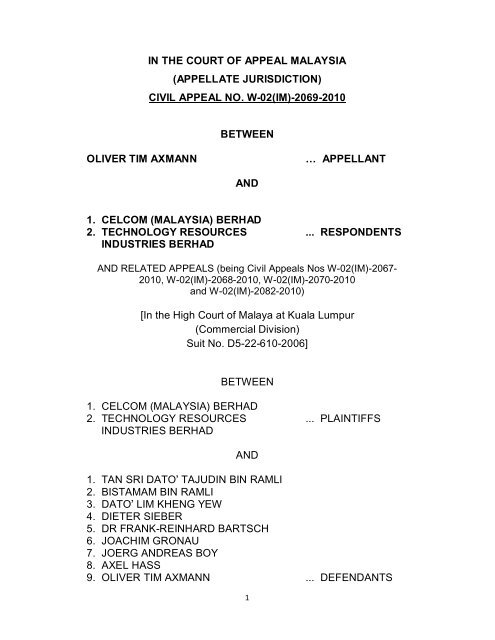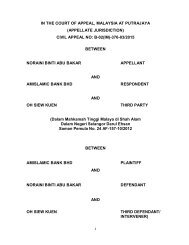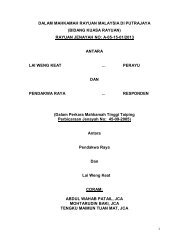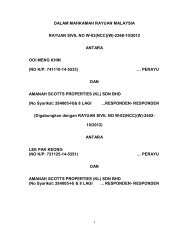W-02IM-2069-2010
W-02IM-2069-2010
W-02IM-2069-2010
You also want an ePaper? Increase the reach of your titles
YUMPU automatically turns print PDFs into web optimized ePapers that Google loves.
IN THE COURT OF APPEAL MALAYSIA<br />
(APPELLATE JURISDICTION)<br />
CIVIL APPEAL NO. W-02(IM)-<strong>2069</strong>-<strong>2010</strong><br />
BETWEEN<br />
OLIVER TIM AXMANN<br />
… APPELLANT<br />
AND<br />
1. CELCOM (MALAYSIA) BERHAD<br />
2. TECHNOLOGY RESOURCES ... RESPONDENTS<br />
INDUSTRIES BERHAD<br />
AND RELATED APPEALS (being Civil Appeals Nos W-02(IM)-2067-<br />
<strong>2010</strong>, W-02(IM)-2068-<strong>2010</strong>, W-02(IM)-2070-<strong>2010</strong><br />
and W-02(IM)-2082-<strong>2010</strong>)<br />
[In the High Court of Malaya at Kuala Lumpur<br />
(Commercial Division)<br />
Suit No. D5-22-610-2006]<br />
BETWEEN<br />
1. CELCOM (MALAYSIA) BERHAD<br />
2. TECHNOLOGY RESOURCES ... PLAINTIFFS<br />
INDUSTRIES BERHAD<br />
AND<br />
1. TAN SRI DATO’ TAJUDIN BIN RAMLI<br />
2. BISTAMAM BIN RAMLI<br />
3. DATO’ LIM KHENG YEW<br />
4. DIETER SIEBER<br />
5. DR FRANK-REINHARD BARTSCH<br />
6. JOACHIM GRONAU<br />
7. JOERG ANDREAS BOY<br />
8. AXEL HASS<br />
9. OLIVER TIM AXMANN ... DEFENDANTS<br />
1
IN THE COURT OF APPEAL MALAYSIA<br />
(APPELLATE JURISDICTION)<br />
CIVIL APPEAL NO. W-02(IM)-3123-<strong>2010</strong><br />
BETWEEN<br />
DETEASIA HOLDING GMBH<br />
… APPELLANT<br />
AND<br />
1. CELCOM (MALAYSIA) BERHAD<br />
2. TECHNOLOGY RESOURCES ... RESPONDENTS<br />
INDUSTRIES BERHAD<br />
AND RELATED APPEALS (being Civil Appeals Nos W-02(IM)-<br />
3121-<strong>2010</strong> and W-02(IM)-3125-<strong>2010</strong>)<br />
[In the High Court of Malaya at Kuala Lumpur<br />
(Commercial Division)<br />
Suit No. D1-22-1960-2008]<br />
BETWEEN<br />
1. CELCOM (MALAYSIA) BERHAD<br />
2. TECHNOLOGY RESOURCES ... PLAINTIFFS<br />
INDUSTRIES BERHAD<br />
AND<br />
1. TAN SRI DATO’ TAJUDIN BIN RAMLI<br />
2. BISTAMAM BIN RAMLI<br />
3. DATO’ LIM KHENG YEW<br />
4. AXEL HASS<br />
5. OLIVER TIM AXMANN<br />
6. DETEASIA HOLDING GMBH<br />
7. BERINGIN MURNI SDN BHD ... DEFENDANTS<br />
2
Coram:<br />
Abu Samah bin Nordin, JCA<br />
Azahar bin Mohamed, JCA<br />
Aziah bt. Ali, JCA<br />
JUDGMENT OF THE COURT<br />
(CELCOM JUDGMENT NO. 1)<br />
[1] There are 2 sets of appeals before us.<br />
[2] The first are 5 related appeals, namely Civil Appeals Nos W-<br />
02(lM)-<strong>2069</strong>-<strong>2010</strong>, Nos W-02(IM)-2067-<strong>2010</strong>, W-02(1M)-2068-<br />
<strong>2010</strong>, W-02(IM)-2070-<strong>2010</strong> and W-02(IM)-2082-<strong>2010</strong>. The 5<br />
appellants in these 5 appeals are the following defendants in Kuala<br />
Lumpur High Court Civil Suit No: D5-22-610-2006 (“the 610 Suit”):<br />
(i)<br />
(ii)<br />
(iii)<br />
(iv)<br />
(v)<br />
The 4 th defendant – Dieter Sieber;<br />
The 5 th defendant – Frank Reinhard Bartsch;<br />
The 7 th defendant – Joerg Andreas Boy;<br />
The 8 th defendant – Axel Hass; and<br />
The 9 th defendant – Oliver Tim Axmann.<br />
The plaintiffs in the 610 Suit are Celcom (Malaysia) Berhad (“the 1 st<br />
plaintiff”) and Technology Resources Industries Berhad (“the 2 nd<br />
plaintiff”).<br />
3
[3] The second set of appeals are 3 related appeals, namely Civil<br />
Appeals Nos W-02(IM)-3123-2012, W- 32(IM) 3121-2012 and W-<br />
02(IM)-3125-20I2. The 3 appellants in these 3 appeals are the<br />
following defendants in Kuala Lumpur High Court Civil Suit No: D1-<br />
22-1960-2006 (“the 1960 Suit”):<br />
(i)<br />
(ii)<br />
(iii)<br />
The 4 th defendant – Axel Hass;<br />
The 5 th defendant – Oliver Tim Axmann;<br />
The 6 th defendant – DeTeAsia Holding GmbH<br />
(“DTAH”);<br />
[4] The plaintiffs in the 1960 Suit are also Celcom (Malaysia)<br />
Berhad (“the 1 st plaintiff”) and Technology Resources Industries<br />
Berhad (“the 2 nd plaintiff”).<br />
[5] For convenience and ease of reference, we will refer to all the<br />
parties in this judgment as in the manner they were referred to in<br />
the 2 Suits in the High Court.<br />
[6] All these 2 sets of appeals arise from the decisions of the<br />
learned judges given in the High Court at Kuala Lumpur dismissing<br />
the various applications filed by the above mentioned defendants<br />
seeking to set aside the issue and service of the Notices of Writ of<br />
Summons and Statements of Claim under 0rder 12 rule 7 of the<br />
4
Rules of the High Court 1980 (‘RHC’) and the inherent jurisdiction of<br />
the Court.<br />
[7] The background facts have been well set out in the judgment<br />
of the learned High Court in respect of the 610 Suit. We will only<br />
repeat in the following paragraphs the relevant facts as narrated by<br />
the learned judge in so far as they are relevant to the issues which<br />
arise for decision in these appeals.<br />
[8] The 1 st plaintiff was a wholly owned subsidiary of the 2 nd<br />
plaintiff until 10.10.2002. During that time, the 2 nd plaintiff was listed<br />
on the Kuala Lumpur Stock Exchange. The 1 st plaintiff is presently<br />
a wholly-owned subsidiary of Telekom Malaysia Berhad.<br />
After<br />
10.10.2002 pursuant to a debt and corporate restructuring exercise,<br />
the 2 nd plaintiff became the wholly owned subsidiary of the 1 st<br />
plaintiff and the listing status of the 2 nd plaintiff was transferred to<br />
the 1 st plaintiff.<br />
The 4 th , 5 th , 7 th , 8 th , and 9 th defendants were<br />
directors nominated by Deteasia Holding GmbH (“DTAH”) on the<br />
Board of Directors of the 1 st and/or 2 nd plaintiffs.<br />
[9] Sometime in 1996, Deutsche Telekom AG (“DTAG”) entered<br />
into various agreements with the 2 nd plaintiff and companies related<br />
to it, including the 1 st plaintiff. Pursuant thereto, DTAG subscribed<br />
5
for shares in the 2 nd plaintiff, and was accorded the status of “sole<br />
strategic investor”. Amongst these agreements were a Subscription<br />
Agreement dated 25.6.1996 and a Management Agreement dated<br />
26.9.1996.<br />
[10] On 12.1.2000, DTAG novated its rights under the Subscription<br />
Agreement and Management Agreement to DTAH, its wholly owned<br />
subsidiary which was the holding company for DTAG’s investments<br />
in Asia. Pursuant to the debt and corporate restructuring exercise<br />
referred to earlier, the 1 st plaintiff, the 2 nd plaintiff and TRI<br />
International Ltd, on 7.2.2002, entered into a Supplemental<br />
Agreement to the Subscription and Management Agreements with<br />
the 1 st plaintiff.<br />
[11] Thereafter, on 4.4.2002, the 1 st plaintiff, the 2 nd plaintiff and<br />
TRI International Ltd entered into an Amended and Restated<br />
Supplemental Agreement (“ARSA”) with DTAH. The Supplemental<br />
Agreement and ARSA form the core of the claim in this Suit. The<br />
Subscription Agreement and ARSA both contain what the<br />
Statement of Claim terms “Veto Rights”.<br />
These “Veto Rights”<br />
provided that the 1 st plaintiff and the 2 nd plaintiff must obtain DTAH’s<br />
written consent if they intended to issue or allot more than 5% of its<br />
shares to another telecommunications company, acquire shares in<br />
6
another telecommunication or otherwise merge with another<br />
telecommunications company. The ARSA also had what the<br />
Statement of Claim called a “Buy-Out Provision”, which provided<br />
that in the absence of the said written consent from DTAH, the 1 st<br />
plaintiff was obliged to obtain a 3 rd party to an offer to purchase its<br />
shares at a prescribed formula.<br />
[12] As it turned out, on or about 28.10.2002, the 1 st plaintiff<br />
entered into an agreement with Telekom Malaysia Berhad to<br />
acquire the whole of the issued and paid-up share capital of TM<br />
Cellular (M) Sdn Bhd without DTAH’s consent.<br />
[13] DTAH then commenced arbitration proceedings against the<br />
1 st plaintiff in the International Court of Arbitration of the<br />
International Chamber of Commerce at Geneva, Switzerland (“the<br />
ICC”). The claim in arbitration turned on the veto Rights” and “Buy-<br />
Out Provision” in the ARSA. The ICC found the 1 st plaintiff liable<br />
and awarded damages and costs to DTAH. The 1 st plaintiff had<br />
made payments on the award to DTAH in full.<br />
[14] Afterwards both the plaintiffs commenced these present 2<br />
Suits.<br />
7
[15] Both the Suits arise in relation to the Arbitration Award dated<br />
2.8.2005 handed down on 30.8.2005 in the ICC arbitration<br />
proceedings between the 1 st plaintiff and DeteAsia Holding GMBH<br />
(‘DTAH’). The ICC found the 1 st plaintiff liable to DTAH for breach<br />
of the Veto Rights and the Buy Out Provision in Clauses 4.1, 4.4<br />
and 5.1(c) of the Amended and Restated Agreement dated<br />
4.4.2002 (‘the ARSA’) between the 1 st plaintiff, the 2 nd plaintiff, TR<br />
International Limited and DTAH. Consequent to such finding, the<br />
Arbitral Tribunal awarded damages of USD 177,243,609 (‘the<br />
principal sum’) with interest and costs.<br />
[16] As we have indicated earlier, the defendants in both the Suits<br />
have filed applications to have the proceedings set aside under<br />
Order 12 rule 7 of the RHC and the inherent jurisdiction of the<br />
Court. The grounds of the said applications were that:<br />
(i)<br />
The subject matter, issues and the facts in the Suits had<br />
been raised and argued by the 1 st plaintiff in the ICC<br />
Arbitration between the 1 st plaintiff and DTAH;<br />
(ii)<br />
The ICC arbitration culminated in a Final Award dated<br />
2.8.2005;<br />
8
(iii)<br />
The Final Award had been registered and enforced as a<br />
consent order and judgment of the High Court of<br />
England dated 17.2.2006;<br />
(iv)<br />
The consent order and judgment had been satisfied in<br />
full on 2.3.2006 in the sum of USD232,999,745.80 and<br />
costs; and<br />
(v)<br />
The Final Award was also registered as a final judgment<br />
of the High Court of Singapore.<br />
[17] Before us, learned counsel for the defendants argued that no<br />
leave to issue out of jurisdiction should have been granted under<br />
Order 11 Rule 4 of the RHC on the grounds that the subject matter<br />
of the suit is caught by issue estoppel and res judicata; and even if<br />
issue estoppel does not arise, the present suit constitute an abuse<br />
of the process of court as they are collateral attacks on the Final<br />
Award.<br />
[18] We have read and reviewed in detail the Appeal Records and<br />
the judgments of the learned High Court judge. We have also<br />
considered the lengthy oral and written submissions of both the<br />
parties. In our view, there is much force in the arguments of the 1 st<br />
and 2 nd plaintiffs that the subject matter and relief claimed in the<br />
9
present Suits was different from that of the ICC arbitration. In our<br />
judgment, based on the factual matrix of the present case, the<br />
learned High Court judge made correct findings of law that issue<br />
estoppel and res judicata had no application to the circumstances of<br />
the case. Our reasons for so deciding are as follows.<br />
[19] For the proper determination of this issue, it must be borne in<br />
mind that in respect of the 610 Suit, the plaintiffs’ claim is based on<br />
the following causes of action. First, breach by the 4 th , 5 th , 7 th , 8 th ,<br />
and 9 th defendants of their fiduciary duties to the 1 st and 2 nd plaintiffs<br />
as a result of the entry into the Supplemental Agreement and ARSA<br />
and the conferral on DTAH the Veto Rights and Buy Out provisions.<br />
In this Suit, both the plaintiffs are seeking to recover profits made by<br />
the various directors as a result of such breaches and (ii) the losses<br />
suffered as a result of such breaches including the payments that<br />
had to be made to DTAH pursuant to the entry into the ARSA and<br />
the subsequent exercise of the Veto Rights.<br />
[20] Furthermore, it is important to note that in relation to the 1960<br />
Suit, the plaintiffs averred that 4 th , 5 th and 6 th defendants wrongfully<br />
and by unlawfully means conspired with each other to injure both<br />
the plaintiffs and/or to cause loss to the plaintiffs by causing and/or<br />
committing them to enter into the 2002 Supplemental Agreement<br />
10
and the ARSA and thereby conferring on DTAH the Buy-Out<br />
Provision in consideration for the renunciation by DTAH of certain<br />
Rights Shares in favour of Tan Sri Dato’ Tajudin bin Ramli. It is also<br />
averred that 4 th , 5 th and 6 th defendants unlawfully conspired with<br />
each other to injure and/or cause loss to the plaintiffs with the sole<br />
and/or predominant purpose of injuring the plaintiffs by subjecting<br />
it to the Buy-Out Provision for which there was absolutely no<br />
commercial benefit or justification whatsoever.<br />
[21] The House of Lord in Sesaconsar Far East Ltd v Bank<br />
Markazi Jomhouri Islami Iran [1993] 4 All ER 456 at 467 has laid<br />
down the general principle that an applicant for leave to serve out of<br />
jurisdiction need only show that that there is an arguable case that<br />
the matter falls within one of the limbs of Order 11 Rule 1(1) RHC<br />
and that in respect of the merits of the claim there is a serious issue<br />
to be tried. In this regard, we agree with the learned judge in the<br />
610 Suit that plaintiffs’ claim could have fallen within the ambit of<br />
Order 11 r 1 RHC 1980 (h) and (j), which provides as follows:<br />
“(h) If the action begun by the writ is founded on a tort committed<br />
within the jurisdiction;<br />
11
(j) if the action begun by the writ being properly brought against a<br />
person duly served within the jurisdiction, a person out of the<br />
jurisdiction is a necessary or proper party thereto.”<br />
[22] In respect of the merits of the claim, from the pleadings, it is<br />
clear that both the proceedings relate to actions by the plaintiffs for<br />
breaches of fiduciary as directors arising from the entry of the<br />
plaintiffs into the Subscription Agreement and ARSA. In this regard,<br />
the 4 th , 5 th , 7 th , 8 th , and 9 th defendants as directors had a clear duty<br />
in law to protect the plaintiffs companies on which they serve as<br />
directors from agreements entered into on unfavourable terms and<br />
to protect the plaintiffs from divided loyalties (see: Bell Group Ltd<br />
v Westpac Banking Corp 70 ACSR 1). The plaintiffs’ claim is also<br />
based on torts of conspiracy. It must be emphasised that the<br />
defendants have not alleged that the elements of breach of fiduciary<br />
duty and tort of conspiracy have not been properly pleaded. From<br />
the pleadings and the affidavits, in our view, there are serious<br />
issues to be tried in both the suits which ought to be dealt with in a<br />
full trial and which cannot be summarily dealt with. Hence in our<br />
view, the plaintiffs have satisfied the requirements under order 11<br />
rule 4 of the RHC in that the procedural requirements have been<br />
12
satisfied and that the plaintiffs have shown that the case against the<br />
respective defendants in both the suits is a genuine one.<br />
[23] This brings us to the argument of learned counsel of the<br />
respective defendants to the effect that there are no grounds to<br />
justify service out of jurisdiction and leave should have been<br />
refused under Order 11 Rule 4(2) RHC as the issues which are the<br />
subject matter of both the Suits had already been decided on in the<br />
Arbitration; hence the doctrine of res judicata and issue estoppel<br />
apply and the plaintiffs are precluded from relitigating these issues,<br />
and that such an attempt to relitigate the issues decided in the<br />
Arbitration amounts to an impermissible collateral attack on the<br />
Award.<br />
[24] We do not agree with these submissions. On the other hand,<br />
we agree with the submissions of the learned counsel for the<br />
plaintiffs that the ICC award did not address the conduct of the<br />
respective defendants or their roles in any of the steps leading to<br />
the Supplemental Agreement and the ARSA, nor did it make any<br />
findings vis-à-vis the defendants on the issues that are raised in<br />
both the Suits.<br />
13
[25] Even more, it must be borne in mind that the defendants in<br />
both the Suits were not parties to the ICC proceedings. It is trite law<br />
that an arbitration award has no effect on persons who were not<br />
parties to the same and cannot be relied on as evidence of the facts<br />
found for the purposes of subsequent proceedings (see: Sacor v<br />
Repsol [1998] 1 Lloyds’ Rep 518, Kastner v Jason [2005] 1<br />
Lloyd’s Law Rep. 397, (Russell on Arbitration 21 st Edition 1997<br />
para 6-210, Law Practice and Procedure of Arbitration by<br />
Sundra Rajoo pg 488). An arbitration award between A and B<br />
does not bind C, a stranger to the arbitration proceedings (see: Sun<br />
Life Assurance Company of Canada v Lincoln National Life<br />
Insurance Co [2005] 1 Lloyds Rep 606 and Dadourian Group<br />
International Inc v Simms [2009] 1 Lloyds Rep 601).<br />
[26] This leads us to the Privy Exception Rule, which states at a<br />
person who was not a party to an arbtration might be bound by the<br />
award if the person was ‘privy’ to the arbitration by virtue of the<br />
person’s interest in it (see: Perumahan Farlim (Pg) Sdn Bhd v<br />
Cheng Hang Guan & Ors [1989] 3 MLJ 223). In our view, except<br />
for the 6 th defendant in the 1960 Suit, it has not been established<br />
how the rest of the relevant defendants in both the suits are<br />
considered privies to the ICC arbitration.<br />
There is no privity of<br />
14
interest between a company and its directors (see:<br />
Shears v<br />
Chisholm [1994] 2 VR 525 and Effem Foods Pty Ltd v Trawl<br />
Industries of Australia Pty Ltd [1993] 43 FCR 510).<br />
[27] It is true that the 6 th defendant is a party to the arbitration.<br />
However, as correctly held by the learned High Court judge in the<br />
Award the Arbitrators did not make any determination as to whether<br />
there was conspiracy on the part of the 6 th defendant. As held in<br />
the case of Purser & Co (Hillingdon) Ltd v Jackson and Anor<br />
[1976] 3 ALL ER 641, where an issue was not included in the terms<br />
of reference, even though a dispute between the parties about it<br />
existed at the time of the arbitration, the claimant would not be<br />
stopped from raising the issue subsequently. The ICC was not<br />
asked to and did not determine whether or not there have on the<br />
facts such a conspiracy between the various parties. In actual fact,<br />
the cause of action in the ICC arbitration and both the present Suits<br />
are different.<br />
[28] For all the reasons stated, we unanimously dismissed all<br />
these appeals with costs in the sum RM50, 000 in favour of the<br />
respondents. Further we order the deposits to be paid to the<br />
respondents to account of costs.<br />
15
Dated 11 th March 2014.<br />
(DATO’ AZAHAR BIN MOHAMED)<br />
Judge<br />
Court of Appeal.<br />
W-02(IM)-<strong>2069</strong>-<strong>2010</strong> and 4 related appeals<br />
Counsel for the Appellants<br />
Christopher Leong<br />
(Lim Tuck Sun & Tan Hui Xian with him)<br />
Messrs. Chooi & Co.<br />
Counsel for the Respondents:<br />
Rabindra S Nanthan<br />
(Nad Segaram with him)<br />
Messrs. Shearn Delamore & Co.<br />
W-02(IM)-3123-<strong>2010</strong> and 2 related appeals<br />
Counsel for the Appellants<br />
Christopher Leong<br />
(Lim Tuck Sun & Tan Hui Xian with him)<br />
Messrs. Chooi & Co.<br />
Counsel for the Respondents:<br />
Rabindra S Nanthan<br />
(Nad Segaram with him)<br />
Messrs. Shearn Delamore & Co.<br />
16





